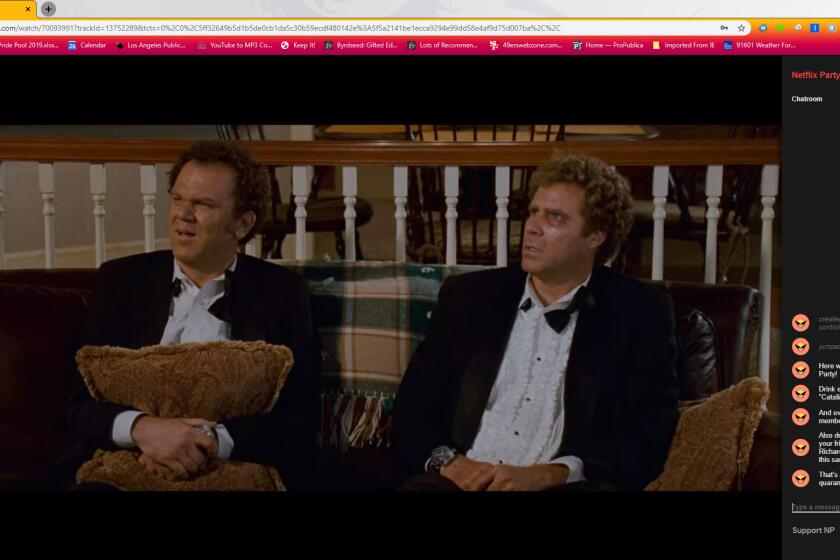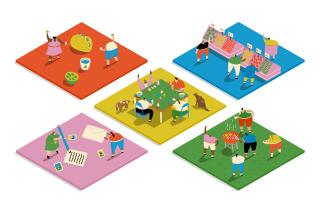Book chats, karaoke, long-distance seders: 10 ways to connect virtually with family and friends

- Share via
It’s 10 a.m. and my 4-year-old races to the computer on our coffee table.
“Is it time for my music class, mama?” she asks hopefully.
“It is,” I say, smiling through the knot that has been tied in my stomach since last week when it started to become shockingly clear that nothing in our lives — in anyone’s lives — was going to be the same again for a long time.
I load up the computer, click on a link to YouTube live and enter “the Hootenanny,” a virtual music and movement class led by Lauren O’Brien and Matt Commerce, two entertainers with a small son, who this week launched a streaming lifeline for the nearly 80 families who have participated daily.
Songs about washing your hands, spending lots of time at home and going for long walks are part of the programming, which the couple are writing each day based on the new reality as dictated by the coronavirus outbreak.
Participants type in their child’s name as they join the group, and O’Brien starts class by saying hello to each kid personally, listing where they are watching from: Arya in Westchester, Idella in midcity L.A., Murray in Burbank, Gabe from Raleigh, N.C., and more.
My daughter’s face lights up with pure joy when her name is read, and tears spring to my eyes. With preschool, play dates and dance classes canceled, “the Hootenanny” has become the one constant in our lives — a needed daily routine in a world that feels suddenly rudderless.
When our social activities are limited to waving at folks walking down our street, the show is a way for us to feel connected to other kids and parents. And we’re far from alone. Almost overnight, virtual gatherings of all kinds are cropping up across the internet, aided by easy-to-use technology like Google Hangouts, Zoom, YouTube, Instagram, WhatsApp, Netflix Party and Facebook Watch Parties.
Lives we once lived out in the world are now being streamed among friends, families and communities longing for connection. People are telecommuting to therapists and taking yoga and cardio classes online, striving to stay healthy in a world that feels anything but. Birthday parties, brunches, play dates and poker nights — as well as dance, art, language, math and reading classes — are all being held virtually. So are deeply intimate interactions such as funerals and Facetime dates between hospital workers and the families they find themselves quarantined from.
Here’s a roundup of stories from some of the most interesting virtual gatherings we have found in these still-early days of a growing crisis.
Book club chats
Los Angeles-based TV writer Erica Rosbe has participated in a virtual book club with friends from New York University for more than a decade. But when social distancing and quarantines because of coronavirus became a daunting reality, the group got serious quickly.
“We did an impromptu Google Hang on Monday night when everything was feeling particularly dire,” she said of her group, “Nerdy Girls.” The women are around the world, including in New Zealand, Wisconsin, Ireland, Florida and New York, and Rosbe says it’s illuminating to realize how every country and town is on its own coronavirus timeline, with some areas less affected than others.
From now on the group will meet via Google Hangouts more frequently than before. Currently the group is reading “Good and Mad: The Revolutionary Power of Women’s Anger” by Rebecca Traister. Not on the reading list: “Station Eleven,” the 2014 novel by Emily St. John Mandel about a flu pandemic that decimates much of the world’s population. Rosbe picked that years ago.
Just because you’re staying home doesn’t mean you have to be lonely. How to set up video chats for a dinner party, game night, karaoke session and more.
Distance dinner parties
Andreas Faisst loves to socialize, so when self-isolation measures meant he couldn’t go to dinner with friends, he switched to a virtual get-together. Faisst, a scientist at the Caltech Infrared Processing and Analysis Center in Pasadena, and his girlfriend, Jennifer Tan, who also works at Caltech, had made dinner plans with four friends for Monday. Instead of getting together in person, they rendezvoused in front of their respective laptop screens.
Faisst created a personal account on the Zoom videoconferencing platform, which he knows from using it at work, and sent invitations for everyone to meet at 7 p.m. People dialed in while they were cooking — Faisst and Tan made udon noodles with mushrooms and peas, one friend had pizza delivered, and others made pasta. The connection wasn’t perfect — the video window isn’t big, which made it hard to see what the other guests were doing. Still, everyone had fun. “We ended up talking more than we would otherwise,” Faisst said. “We caught up on what’s happening. There was less moving around and more focused discussion, which was different but very good.”
So good, that he’s already planning to invite the five to seven coworkers he normally eats lunch with in the Caltech cafeteria to meet for virtual lunches. “That’s a hard thing I miss the most,” he said. “My prediction is that I will talk to my friends much more than if I was at work.”
Virtual seders
Actor and writer Ashley Bank O’Leary, hasn’t seen her father or stepmother in more than a week. Her stepmother is immunocompromised, so she doesn’t expect the situation to change soon. Extremely social by nature, O’Leary and her husband, who live in L.A., have started text chains for regular check-ins with family members and friends. It was during a family group-texting session that her stepmom suggested setting up a virtual seder. The plan is for relatives — throughout California — to set up Zoom on their laptops and to place those laptops in their dining rooms. O’Leary’s stepmom, in Los Angeles, will likely distribute an ingredient list and a family member, yet to be nominated, will lead the proceedings.
The best part? The virtual nature of the gathering allows family members from around the country — who wouldn’t have been able to travel to L.A. for the originally scheduled event — to participate.
Ice-skating watch parties
Last year former figure skater Janet Tscha began hosting a virtual ice-skating watch party called “Skating Lesson” via a new interactive, live-events platform called CYA Live. Her watch parties were rolling along nicely until coronavirus began its global rampage and the 2020 World Figure Skating Championships, scheduled to be held in Montreal this month, were canceled. Overnight her group more than doubled from 40 to more than 100, as disappointed skating fans gathered to watch, comment and commiserate on old championship videos together.
“The loss of sports is huge,” Tscha says, adding that “Skating Lesson” has upped its watch parties from one to three a week to fill the gaping void left by canceled games and competitions.
It’s no Catalina Wine Mixer, but a Google Chrome extension enables Netflix users to sync viewing and chat while they watch from social isolation
Meditation moves online
Shawnta Valdes isn’t big on technology. She just joined Instagram this week. So when the New York transplant was told that she needed to teach her daily meditation class virtually via Zoom, she immediately thought, “This isn’t going to work.” Valdes is the director of member engagement at the Jane Club, a shared workspace for women and working moms in Los Angeles, and every day for the past two years she has guided her community of professional moms through daily awareness-based group meditation.
When all programs at the Jane Club, including child circle time, and teach-ins, went virtual practically overnight, Valdes linked to Zoom on her computer and found herself face to face with her most consistent student, sitting in her living room. Twenty-two women joined that morning — more than Valdes normally has in a regular class. They checked in with their breath and focused their attention on various parts of their bodies with Valdes’ soothing voice as their guide.
“This is a beautiful way for us to connect,” Valdes says. “And I have to say, much to my own surprise, the connection is just as deep, as real, and as effective.”
Virtual recovery
A San Francisco-based woman who works in marketing and social media says she was heartened to discover the speed with which Alcohol Anonymous began hosting virtual meetings. She says the movement began in earnest last week in New York where the number of participants crashed Zoom’s free application.
The woman now hosts a small virtual 12-step meeting with other moms she knows online, just to check in each day to see how everyone is doing with this unprecedented pressure.
“It’s been a really pivotal moment in my sobriety,” says the woman, who asked that her name be withheld for privacy. “It’s interesting to see how the fellowship adapts and changes based on the needs of the community.”
Karaoke meetups
Bars and restaurants across the country may be closed. But that’s not stopping Alex Zaragoza from engaging in one of her favorite pastimes: karaoke. The senior staff writer for Vice gathered her friends recently for a virtual karaoke night on Google Hangouts, where they belted out the lyrics to Linkin Park’s hit “In the End” among other jams.
Before the coronavirus outbreak, the Brooklyn resident and her friends would stop by Beats Karaoke Cafe, a small karaoke spot with private rooms she’s frequented since 2018. “It’s our notorious hangout spot. We’ve seen many nights of drunk singing and debauchery and birthday celebrations there,” she said by phone.
But “exasperated by cabin fever and a deep desire to belt out ‘Torn’ by Natalie Imbruglia,” Zaragoza writes at Vice, she decided to find another way to keep the singing going. “New York is such a packed city and you’re always surrounded by people … so being in self-isolation and social-distancing in a city that is so social and surrounded by people, it’s been really hard,” she said. “Many of my friends work in media so we’re always stressed out, and we really try to take time to check in on each other, and karaoke is a way we check in and release stress because it’s just super fun.” They had such a blast that Zaragoza hopes it becomes a weekly or biweekly activity.
Virtual group playdates
Micheltorena Street Elementary School in Silver Lake is closed, but some room parents are doing their best to make sure the kids don’t feel too disconnected from their friends. Lianna Colaso, who has two children at the school — one in kindergarten and another in third grade — helped gather 20 kindergartners together for a virtual playdate via Zoom on Wednesday. It’s a meetup she hopes to continue twice a week for as long as school shutdowns last.
Was it Zoom chaos? Colaso laughs.
“It’s so funny because they just don’t say anything,” she says. “They just say, ‘hi,’ ‘hi, ‘hi.’ ”
That will change, she speculates, as they get used to this new way of doing things.
Game Nights
When Lisa Leeman found out a friend’s 65th birthday party was canceled because of the outbreak, she pulled together a virtual party to replace it. About 10 people logged in via Zoom over the course of Saturday night. The same group regularly gets together to play bridge and other games, so it wasn’t a surprise when someone suggested playing 20 questions. Leeman used Zoom’s chat room feature to keep track of the questions. “We did round robins of questions, that was fun,” she said.
Leeman, a documentary filmmaker and professor at USC’s School of Cinematic Arts, plans to use Zoom once classes resume after spring break. She’s experimenting in non-work settings as practice. Her first virtual dinner party was with two friends last week. Next she wants to try a virtual movie screening.
Doing things online is a great antidote to not being able to go out, Leeman said. “I’m trying to find that balance,” she said. “I want to have virtual coffees or cocktail hour. I’m going to get creative about it, because what else can we do?”
Hank Azaria, David Schwimmer and friends have kept their poker gang together on Zoom, even as player Aaron Tveit tested positive for COVID-19.
Virtual letters
It’s better known as email, and you can use it to write long, thoughtful letters to friends and family members who are not tech savvy or who might be feeling overwhelmed by the sudden ubiquity of screen time in their lives. My father, Joseph Gelt, is one such person. Addicted to books and proudly without a cellphone, my father is turning 75 next week. “I know that we won’t be able to visit,” I told him the other day, “But I promise we can FaceTime.”
“Please, not that,” he replied, joking, but not. His gift this year — the greatest gift I could possibly give him — will be an old-fashioned letter, filled with thoughts about our new lives, observations about my day and anecdotes about his granddaughter.
I’ll have my mom print it out and put it in a real envelope, so he can open it and savor it like it arrived via snail mail but without the need to sanitize after reading.
Correspondent Michelle V. Rafter and Times staff writer Dorany Pineda contributed to this report.
More to Read
Sign up for our Book Club newsletter
Get the latest news, events and more from the Los Angeles Times Book Club, and help us get L.A. reading and talking.
You may occasionally receive promotional content from the Los Angeles Times.










